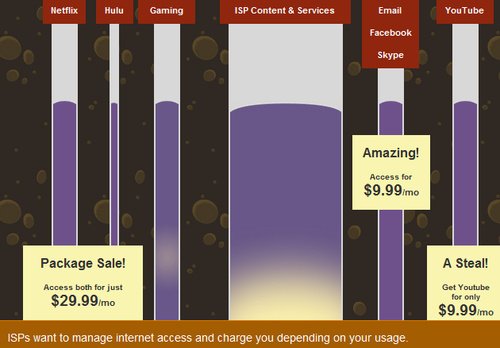How did we get to the place where a NON-ELECTED commission started regulating the Internet without Congressional approval? Seems the FCC is a little big in the britches........they are supposed to regulated radio, phone, and TV. How is the Internet any of those things?

Well, it's a funny story. They don't have the authority to regulate the Internet, but they do have the authority to regulate broadband Internet access providers. A long time back, the companies that provide Internet service were sued because one of the things people found via their services was porn. Yup, dirty pictures over the Internet. Shocking, I know.
Now, the Internet service providers (ISP) could try to address this by attempting to filter all content, over all the various transit protocols (HTTP, HTTPS, FTP, UUCP/TCP, NNTP, SMPT, and so on) for all the possible sources. This sort of setup is often called a 'walled garden.' That turns out to be pretty hard, especially for encrypted channels.
The other alternative they could try was to plead that they were a common carrier, just like the phone company, a simple provider of communications service, and so not liable for whatever data moved across their service. Now, a common carrier holds itself out to provide service to the general public without discrimination for 'public convenience and necessity'. This would allow them to ignore the content of the packets of data moving through their service, so they wouldn't be liable for the naughty bits, but would make them a regulated and licensed service. That wouldn't do.
Ah, but the Internet is sort of built atop the telecommunications networks, which are common carriers. So, they came up with the idea of being an Information Service which merely made use of common carriers, to try and dodge common carrier regulation while hiding under the common carrier's skirts for content liability.
This worked OK for a while, and let them play under Title 1 of the Communications Act of 1934 as Information Services or Enhanced Services, just like those 'party line' conversation services one could reach over the phone. Then Congress passed the Telecommunications Act of 1996, which set up regulatory regimes for cable TV, voice services, and information networks. The Act specifically stated that a carrier is not a 'telecommunications carrier' when it is simply selling broadband access. There are specific regulations for 'telecommunications carriers', but not for pure 'information services', such as broadband providers.
The bits of Title V of the 1996 Act that survive provide ISPs with protection from liability for third party content on their services, and legal definitions of the Internet, so they were still protected from those pesky porn lawsuits. They did get tucked under the FCC, though. This was confirmed by a declaratory ruling back in 2002.
The fun comes in where we have telecommunications carriers that also want to be information services, often over the same pair of wires. DSL service, or cable internet service from a company that also does phone-over-cable hit this, as do various third parties (Magic Jack...) that offer phone service that relies on the Internet access to the customer for transport. This puts competing telecommunications carriers head-to-head on the same 'information service'.
The whole net neutrality thing comes from the concern that a telecommunications carrier that controls an information service might manipulate the behavior of the information service to the advantage of the controlling telecommunications carrier and the disadvantage of others. This can be done with modern packet switches algorithmically to give priority to one particular packet format, source, or destination over another.
For example, there was some suspicion in 2008 that the ATT network routers were de-prioritizing Skype and similar non-ATT voice over IP traffic, based on statistical traffic analysis. COMCAST has used it's Sandvine packet filter system to slow some traffic, including IPTV applications, at it's peering points where it connects it's private network to the Internet.
The Net Neutrality policy says that it is naughty to use their position as an information service to promote their own telecommunications carrier business over that of others. Information services, that is, Internet access, is to be impartial.


